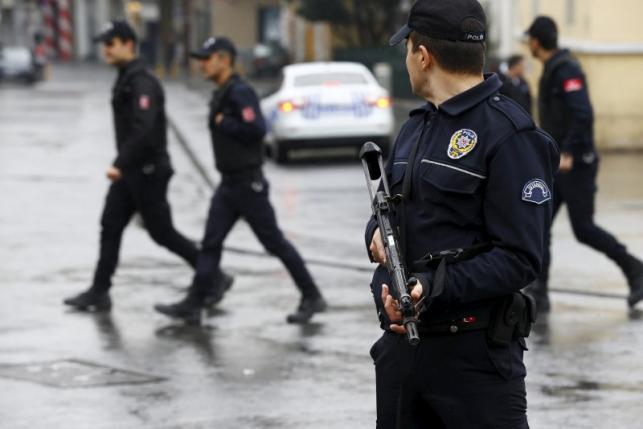
A police officer secures the area following a suicide bombing in a major shopping and tourist district in central Istanbul March 19, 2016. REUTERS/Osman Orsal
President Tayyip Erdogan said on Monday Turkey would use its entire military and intelligence might to battle “one of the biggest and bloodiest terrorist waves in its history”, after a suicide bomber targeted the famous Istiklal street killing three Israelis and an Iranian in Istanbul.
“Turkey has recently been facing one of the biggest and bloodiest terrorist waves in its history … Our state is fighting terrorist organizations and the forces behind them with everything at its disposal – its soldiers, police, village guards and its intelligence,” Erdogan said in a speech in Istanbul.
Israeli Defense Minister Moshe Yaalon described Turkey as “awash in terrorism”. Turkey’s main opposition party blamed what it called the government’s policies in the Middle East for turmoil washing across Syria’s borders.
“What we are going through now is the result of the (ruling) AK Party’s unstable, contradictory, utopian, adventure-seeking policies in the Middle East,” CHP group deputy chairman Engin Altay told a press conference in parliament.
Saturday’s attack on Istiklal Street, a long boulevard packed with international stores, shopping centers, restaurants and foreign consulates, was the fourth suicide bombing in Turkey this year. Two in Istanbul have been blamed on ISIS, while the two others in the capital Ankara have been claimed by Kurdish militants.
The attacks have raised questions at home and among NATO allies as to whether its security services are overstretched as they fight on two fronts.
But Erdogan’s critics, including privately some of Turkey’s allies, argue that Erdogan’s focus on battling Kurdistan Workers Party (PKK) militants in the largely Kurdish southeast – a campaign he has repeatedly vowed will continue – comes at the cost of its fight against ISIS.
Erdogan said the PKK and other groups were collaborating with ISIS and had turned on Turkey because they had failed to achieve their aims elsewhere in the region. He accused Europe of “two-faced behavior” for allowing PKK sympathizers to set up a tent near an EU-Turkey summit in Brussels last week.
Turkey, a part of a U.S.-led coalition against ISIS, has rarely witnessed widespread violence except in 1960 when a military coup incited civil disorder, and in the 1970s and 1980s left-right street clashes that triggered two further army interventions. Recently, violence in Turkey is escalating with the country’s fight against the Kurds, especially since July after the Kurd’s territorial gains in Syria.
Government officials deny suggestions that Turkey, long seen by Washington as a model for Islamic democracy but now facing Western criticism over its human rights policies, is not focused on fighting ISIS.
At least half a dozen newspapers from across the political spectrum carried head-and-shoulders pictures of three more suspected ISIS members on Monday, warning they had been instructed to stage further attacks in crowded areas.
“All provincial police units have taken action to try to capture the three terrorists suspected of being ISIS members planning sensational attacks,” the state-run Anadolu news agency said.
Interior Minister Efkan Ala on Sunday identified the Istanbul bomber as a Mehmet Ozturk, born in 1992 and from the southern province of Gaziantep near the Syrian border. Five people had been detained in connection with the blast.
